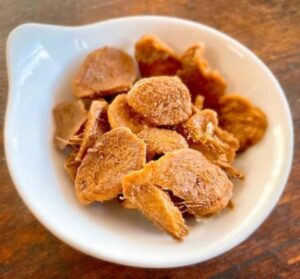Ginger a Superfood: Revealing 10 Marvels
Introduction
As a superfood Ginger (Zingiber officinale) is more than simply a tasty spice; it’s a natural powerhouse with several health advantages and applications. For generations, this rhizome has been recognized in traditional medicine and culinary arts around the world, gaining the title of “superfood.” Modern research verifies what ancient civilizations instinctively knew: ginger is rich in bioactive chemicals such as gingerol, shogaol, and zingerone, which have significant anti-inflammatory, antioxidant, and antibacterial activities.
Whether you’re making a calming tea, enhancing a savory meal, or tapping into its medical potential, ginger is a versatile ingredient and natural treatment. Its ability to relieve nausea, aid digestion, enhance immunity, and reduce inflammation makes it an essential component of any diet. Aside from its health benefits, ginger is also surprisingly easy to cultivate, requiring little room and work. Growing ginger at home allows you to reap its advantages straight from your garden while avoiding pesticides and chemicals.
With its deep impact on well-being and indisputable culinary appeal, this superfoodprovides a simple but effective method to improve your health and lifestyle. In a previous blog, I discussed many other foods that are powerhouses nature bestowed on us. Now we will discover the benefits of this wonder and see its potential as a vibrant, comprehensive complement to your daily routine.
1. Nutritional Composition

This Highly beneficial rhizome may appear humble, but it has a rich nutritional profile. It contains:
- Vitamins and Minerals: Vitamins and minerals include vitamin B6, magnesium, potassium, manganese, and copper
- Bioactive Compounds: Gingerol, shogaol, paradol, and zingerone are strong phytonutrients that provide therapeutic benefits
These chemicals, particularly gingerol, add to it’s antioxidant, anti-inflammatory, and antibacterial properties, making it a superfood overall.
2. Anti-Inflammatory
Chronic inflammation is a subtle contributor to diseases such as arthritis, cardiovascular disease, and diabetes. According to studies, its anti-inflammatory benefits stem from its capacity to suppress pro-inflammatory chemicals such as cytokines and prostaglandins.

- Arthritis Relief: Clinical investigations show that its extracts help relieve pain and stiffness in osteoarthritis sufferers, offering a natural alternative to pharmaceutical medications
- Post-Exercise Recovery: Ginger’s ability to alleviate muscle discomfort helps athletes recover faster
3. Superfood as a Digestive Powerhouse
It has been used for generations to treat stomach issues. Modern science has validated its importance in intestinal health:
- Eases Nausea: Ginger is particularly good for treating nausea caused by motion sickness, pregnancy (morning sickness), or chemotherapy. According to research, it acts by altering the central nervous system and intestines, hence relieving nausea
- Improves Digestion: This superfood increases digestive enzymes and bile production, resulting in better nutrient absorption. It can also help with bloating and flatulence, making it appropriate for people with irritable bowel syndrome (IBS).
4. Heart Health Ally
Cardiovascular disorders are the major cause of death globally. Ginger acts as a natural defender for heart health:

- Reduces Blood Pressure: Ginger’s potassium concentration and vasodilator characteristics relax blood arteries, lowering hypertension
- Cholesterol Management: Research indicates that ginger can reduce LDL (“bad”) cholesterol and triglycerides while improving HDL (“good”) cholesterol
- Anti-Clotting Properties: Ginger has anti-clotting properties because it prevents excessive platelet aggregation, which lessens the risk of strokes and heart attacks
5. A Natural Immune Booster
Ginger’s antibacterial and antiviral capabilities protect the immune system from common illnesses:
- Cold and Flu Remedy: Ginger tea has long been used to treat colds. It relieves nasal congestion, soothes sore throats, and provides warmth to speed up healing
- Antioxidant Shield: Its high antioxidant concentration fights oxidative stress, which can damage immunity and hasten aging
6. Cancer Prevention Potential

Emerging research emphasizes ginger’s function in cancer prevention and treatment. Its bioactive substances have the capability to:
- Inhibit Tumor Growth: Gingerol and shogaol have been found to inhibit tumor growth, particularly in breast, ovarian, and colorectal malignancies
- These chemicals induce apoptosis, or programmed cell death, in cancer cells without affecting healthy ones
While additional research is needed, these findings show promise for integrative cancer therapy.
7. Supports Cognitive Health
Cognitive decline and neurological disorders such as Alzheimer’s and Parkinson’s are becoming increasingly prevalent in aging populations. It improves brain health by:
- Reduces Neuroinflammation: Its anti-inflammatory effects protect neurons from injury
- Enhancing Memory and Focus: It’s supplementation has been shown in animal studies to increase memory and cognitive performance
Regular drinking may serve as a natural preventative measure against cognitive deterioration.
8. Metabolic Mastery and Weight Management

This superfood improves metabolism and promotes healthy weight management through a variety of mechanisms:
- Boosts Thermogenesis: It increases heat production in the body, which helps burn calories
- Reduces Appetite: This contains compounds that modulate hunger hormones, preventing overeating
- Improves Insulin Sensitivity: For diabetics, it can help the body use insulin more effectively, which aids in blood sugar control
9. Antimicrobial and Antifungal Properties
Another marvel is it protects against viruses, germs, and fungi. Its essential oils can limit the growth of dangerous microorganisms, including:
- E. coli: It causes food poisoning
- Candida: It is a common fungal infection
This makes ginger an ideal addition to diets for natural infection prevention.
10. Benefits for Skin and Hair
Beauty frequently reflects internal health, and ginger has benefits in this regard as well:
- For Skin: Ginger’s antioxidants fight free radicals, which cause wrinkles and skin damage. Its anti-inflammatory properties relieve acne and other skin irritations
- For Hair: This superfood promotes hair development by increasing blood circulation to the hair follicles. Its antibacterial capabilities also improve scalp health and reduce dandruff.
Ginger as a Superfood in Diet
This wonderful rhizome is versatile and easy to incorporate into daily routines. Here are some suggestions:

- Fresh Ginger: Grate or slice ginger into drinks, soups, or stir-fries
- In Powder Form: It is ideal for baking or spicing up smoothies and porridge
- Ginger Tea: A warm, calming beverage that is both therapeutic and delicious
- Pickled: It is a tart palette cleanser that’s frequently served alongside sushi
- Ginger supplements: These are available in the form of pills or extracts for more concentrated benefits.
Precautions and Considerations
While this superfood is generally considered harmless, moderation is essential. Excessive consumption may cause heartburn and interfere with blood thinners. Pregnant women and anyone with gallstones should seek medical advice before drastically increasing their ginger intake.
Conclusion
Overall as a superfood, ginger has numerous advantages, which range from digestive relief to inflammation reduction and immunity boost, which are supported by both research and tradition. Its ability to prevent disease, enhance metabolism, and promote overall well-being makes this superfood an essential component of modern diets. Whether you’re sipping its tea on a cold morning or adding zing to your meals, this dynamic food demonstrates that nature frequently has the answers to our health problems.
Accept this amazing rhizome as a tasty ally on your journey to a healthier, happier lifestyle.
Happy Gardening!
Disclaimer
The content provided on this website is purely for educational purposes. We are neither nutritionists nor do we intend to mislead our readers by providing any medical or scientific information.







